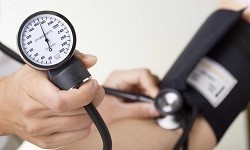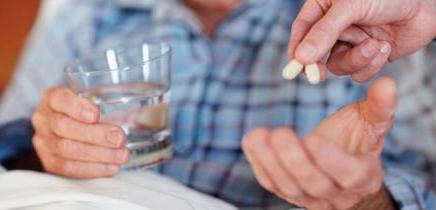Vazocardine is used in cardiology to lower blood pressure, coronary heart disease, arrhythmia and tachycardia.
This medication can also be used to prevent migraine. It has antihypertensive and antiarrhythmic pharmacological action.
On this page you will find all information about Vazocardin: the full instruction on the application for this medicine medium, average prices in pharmacies, complete and incomplete analogs of the drug, as well as reviews of people who have already applied Vasocardine. Want to leave your opinion? Please write in the comments.
Clinical and pharmacological group
Beta1-adrenoblocker.
Conditions of leave from pharmacies
It is released on prescription.
Price list
How much does Vazocardin cost? The average price in pharmacies is at the level of100 rubles.
.Form of issue and composition
The drug Vazocardin is available in the form of tablets intended for oral administration. Tablets are round flat in appearance, white or slightly yellowish in color, with a horizontal strip in the middle. The drug is produced in blisters of 10 pieces, in a carton pack is placed on 2 or 5 blisters.
Each tablet contains active ingredient metoprolol tartrate in an amount of 50 or 100 mg, as well as auxiliary components - starch, silicon dioxide, povidone, calcium stearate, cellulose.
Pharmacological effect
It should be noted that "Vazocardine its analogs have almost the same effect. The principle of it is as follows:
- Fights with arrhythmia.
- Prevents the development of migraine.
- The number and severity of angina attacks decreases.
- Increases endurance during exercise.
- Symptoms of hypoglycemia in diabetics become less pronounced.
- It promotes increase of triglycerides, reduction of free, fatty acids.
- With continued use helps reduce cholesterol.
- The heart rate decreases, as well as the strength of myocardial contractions of cardiac output. Sinus rhythm is restored.
- Reduces blood pressure during physical exertion and stressful situations. Decrease in pressure is observed at least 15 minutes after the drug is taken, or a maximum after a couple of hours. The effect lasts for 6 hours.
It should also be noted that the active substance metoprolol is almost completely absorbed, quickly distributed throughout the body. Easily crosses the BBB, the placenta and penetrates into breast milk. Biodegradation occurs in the liver, excreted mainly by the kidneys. You can not withdraw with hemodialysis.
Indications for use
Indications for the appointment of Vasocardin are the following diseases:
- Ischemic heart disease: myocardial infarction (complex therapy, secondary prevention), angina attacks.
- Arterial hypertension (in combination with other antihypertensive agents and as a monotherapy).
- Violations of the heart rhythm (ventricular extrasystole, supraventricular tachycardia).
- Functional disorders of the heart, which are accompanied by tachycardia.
- Hyperthyroidism (as part of complex treatment).
- Attacks migraine - for the prevention.
Contraindications
Vazocardin is contraindicated at the age of 18, with increased sensitivity to one or more of the components that make up the drug, and during lactation.
The use of Vasocardina is contraindicated also under the following conditions:
- Sinus bradycardia (heart rate less than 50 beats per minute);
- Angina of princemetal;
- Cardiogenic shock;
- Chronic heart failure in the stage of decompensation;
- Sinoatrial block;
- Acute myocardial infarction;
- Arterial hypotension (with Vazocardina for secondary prevention of myocardial infarction: heart rate less than 45 beats per minute);
- Simultaneous intravenous administration of calcium channel blockers such as verapamil;
- Pheochromocytoma (without simultaneous use of alpha-blockers);
- Expressed violations of peripheral circulation;
- SSSU;
- AV-blockade of the second and third degree (without an artificial pacemaker);
- Deficiency of lactase, lactose intolerance or glucose-galactose malabsorption;
- Simultaneous use of MAO inhibitors.
Vazocardin should be used with caution in elderly patients and in the presence of the following pathologies:
- Myasthenia gravis;
- Thyrotoxicosis;
- Bronchial asthma;
- Diabetes;
- Violation of the function of the liver;
- Impaired renal function;
- Metabolic acidosis;
- Psoriasis;
- Depression;
- Allergic reactions in the anamnesis;
- Obliterating diseases of peripheral vessels;
- Chronic obstructive pulmonary disease.
Application in pregnancy and lactation
Studies have shown that the active ingredients of the drug do not have a teratogenic effect on the fetus, but the use of vasocardin during the period bearing a child can lead to a delay in fetal development of the fetus, slowing down the heart rate in the child, lowering the glucose level in his blood. That is why this drug is not recommended for the treatment of women during pregnancy.
During breastfeeding, Vasocardine tablets are not prescribed, as there is no reliable evidence that the active ingredients do not penetrate the mother's milk, and then into the baby's body. If it is necessary to use this medication during lactation, the question of stopping breastfeeding should be resolved.
Instructions for use
The instructions for use indicate that Vasocardin is intended for oral use. To achieve maximum therapeutic effect, it is recommended to take the drug at the same time of the day, preferably in the morning. Tablets Vazocardine should be taken whole, washed down with a small amount of drinking water. When choosing the optimal therapeutic dose should regularly monitor heart rate, blood pressure and ECG. The dose of metoprolol and the duration of taking the drug Vazocardin is determined by the doctor.
- In angina pectoris, as a rule, metoprolol is prescribed in an initial dose of 50 mg twice a day. If necessary, the dose of metoprolol is gradually increased.
- With arterial hypertension, as a rule, appoint metoprolol in a dose of 50 mg twice a day. If necessary, the dose is gradually increased to 200 mg per day. The daily dose can be taken for 1 reception or divided into 2 divided doses.
- In cases of cardiac rhythm disturbances, as a rule, metoprolol is prescribed in a dose of 50 mg twice a day. In case of insufficient therapeutic effect, the dose of metoprolol is gradually increased or prescribed for additional antihypertensive or antiarrhythmic therapy.
- Patients who underwent myocardial infarction, as a rule, are prescribed metoprolol in a dose of 100 mg twice a day. The drug should be taken after the end of the acute phase of myocardial infarction.
- To prevent migraine attacks, as a rule, appoint metoprolol in a dose of 50-100 mg twice a day.
The maximum recommended daily dose of the drug is 200 mg. Patients with severe liver dysfunction may need a metoprolol dose adjustment.
Discontinue use of the drug Vazocardin follows by gradually reducing the dose.
Side effects
The most common side effects of the drug are:
- Pronounced decrease in blood pressure, sinus bradycardia, orthostatic hypotension;
- Increased fatigue, headache, slower reaction rate, weakness;
- Dry mouth, nausea, vomiting, constipation / diarrhea;
- Dryness and soreness of the eyes, decreased vision and hearing, tinnitus, conjunctivitis;
- Dyspnea;
- Allergic reactions;
- Hyperglycemia, hypoglycemia, hypothyroid conditions;
- Increased body weight;
- The withdrawal syndrome is in case of abrupt cessation of treatment.
Overdose
Overdose: arterial hypotension, sinus bradycardia, AV blockade, heart failure, cardiogenic shock, cardiac arrest, bronchospasm, loss of consciousness, coma, nausea, vomiting, cyanosis. The first signs of an overdose appear after 20 minutes-2 hours after taking the drug.
special instructions
- The effectiveness of beta-blockers decreases in smokers.
- When taking a dose of vasocardin more than 200 mg per day, cardioselectivity decreases.
- With angina pectoris, the selected dose of the drug should provide a heart rate at rest within 55-60 beats / min, with a load of not more than 110 per minute. Approximately in 20% of patients with angina pectoris beta-blockers are not effective (the main causes are severe coronary atherosclerosis with a low threshold of ischemia and increased end-diastolic pressure of the left ventricle, which violates the subendocardial blood flow).
- Control of people taking vasocardin means regular monitoring of blood pressure and heart rate (at the beginning of treatment - each day, and then - 1 time in 3-4 months), as well as for the level of glucose in the blood in patients with diabetes mellitus (1 every 4-5 month).
- The abolition of the tablets is carried out gradually, reducing the dose for 10 days. With a sharp rejection of the drug can develop withdrawal syndrome (increased blood pressure, increased attacks of angina).
- It is required to monitor the condition of people with depressive disorders using vasocardin. If taking the drug worsened depression, it is recommended to stop treatment.
- At the beginning of therapy with Vasocardine, patients may experience fatigue, dizziness. Therefore, care must be taken when driving vehicles and engaging in other hazardous activities.
Drug Interactions
- There is a mutual increase in the oppressive effect on the central nervous system with alcohol.
- Indomethacin weakens the hypotensive effect.
- Increased risk of violations of peripheral circulation with ergot alkaloids.
- Summation of cardiodepressive effect with anesthesia.
- Summation of a negative chronotropic and dromotropic effect when combined with cardiac glycosides.
- Increased danger of withdrawal syndrome when combined with clonidine. Rifampicin decreases, and cimetidine raises the concentration in the blood plasma.
- An increase in the severity of bradycardia, congestion and hypotension in the use of metoprolol with verapamil, diltiazem, antiarrhythmics, reserpine, alpha-methyldopa, clonidine, guanfacin.
- Strengthening the effect of hypoglycemic action of insulin (weakening - oral hypoglycemic drugs). When combined with antihypertensive drugs, nitroglycerin or BCCC, severe hypotension may develop (special caution is necessary when combined with prazosin).
Reviews
We picked up some feedback from people about the drug:
- Sasha. Naturally, most drugs, including vasocardin, which reduces high blood pressure and normalizing heart rhythm, it is necessary to drink according to the purpose and under the control of the doctor due to their side effects actions. A competent cardiologist appoints vasocardin, assessing its correlation of benefit and possible damage to the patient's health, since the sensitivity in all patients to this drug is different. In my case, on the third day after taking this medication, the pressure stabilized, but the back started to hurt, even the painkillers did not help. Due to the side effect, he stopped taking this medication.
- Zhenya. The doctor prescribed vasocardin for the prevention of migraine attacks. The drug, as she explained, basically reduces blood pressure, but the reason that my migraines appear just as the pressure increases and is connected. That's why I now take vasocardine in tablets. The price of it is affordable, in the treatment of migraine and the prevention of its occurrence, it helps me better than other analogues that I have tried to take.
Analogues
There are analogues of this drug Vasocardin, which either have the same active substance, or are similar in effect. Note that there may still be differences between them, so be sure to consult a specialist about the possibility of using them instead of Vazocardina.
These include:
- Betalk;
- Corvitol;
- Metodok;
- Metocard;
- Metoprolol;
- Serdol;
- Emzok and others.
Before using analogues, consult your doctor.
Storage conditions and shelf life
Its shelf life is 3 years, provided it is stored in a dry place, protected from sunlight.
How to choose probiotics for the intestine: a list of drugs.
Effective and inexpensive cough syrups for children and adults.
Modern non-steroidal anti-inflammatory drugs.
Review of tablets from the increased pressure of the new generation.
Antiviral drugs are inexpensive and effective.



